Digitalization of the economy and its impact on economic development and social welfare
DOI:
https://doi.org/10.21638/spbu05.2020.202Abstract
The article is devoted to the problems of digitalization of the modern economy and its influence on economic processes that determine economic growth and social welfare. It is noted that digitalization does not become a significant factor of economic growth and has a contradictory effect on the growth and size of GDP; further development of the theoretical foundations of analysis and measurement of economic growth in the conditions of digitalization is required. The role and importance of process innovations in the conditions of digitalization are highlighted, the wide application of which may not lead to GDP growth. It is shown that the business in the field of computer and information technologies, as well as the sharing business, based on the widespread use of Internet services and cloud technologies, is currently developing rapidly. It is noted that companies operating in the field of network technologies often do not have a very clearly defined amount of material capital; their business is based on using existing or creating their own digital platforms located on the Internet; they often do not own any significant material assets. For them, it is extremely difficult to determine the amount of capital spent, and the useful result of such a business-processing and issuing information- does not have an unambiguous quantitative assessment. It is necessary to develop new forms of evaluating the useful results of this business. Sharing business, while influencing the growth of individual welfare, can simultaneously lead to a reduction in public welfare, since it encourages the distributed use of existing items of shared consumption, rather than increasing their production. It is noted that for businesses that rely on Internet services, the management system is simplified, which is reduced to managing the creation, processing and redistribution of information, rather than creating new products and industries, which also inhibits economic growth. The processes of globalization and monopolization in the digital economy are analyzed. Digitalization of the economy requires the development of economic theory, taking into account modern realities.
Keywords:
digitalization of the economy, economic growth, social welfare, sharing economy, Internet service, cloud technologies, e-Commerce, labor productivity, GDP
Downloads
References
Лашински А. (2018) UBER. Инсайдерская история мирового господства. Пер. с англ. М.: Эксмо. 320 с.
References in Latin Alphabet
Downloads
Published
How to Cite
Issue
Section
License
Articles of the St Petersburg University Journal of Economic Studies are open access distributed under the terms of the License Agreement with Saint Petersburg State University, which permits to the authors unrestricted distribution and self-archiving free of charge.






